Search
close
Stay in the loop with our monthly newsletter, bringing you a fresh take on all things property.
Form funnels into a Pardot list to update Prospect sign up for Estate Agent and New Homes
"*" indicates required fields
UK house price inflation - August 2024
New sales agreed year-on-year
Homes for sale marked as ‘chain-free’
“Home buyers are benefitting from the lowest average mortgage rates for 15 months. This is supporting double-digit growth in all the key measures of sales market activity. Annual house price inflation is positive, but remains below 1%”
Home buyers are benefitting from the lowest average mortgage rates for 15 months, which is supporting double-digit growth in all key measures of sales market activity. UK house price inflation is positive, but remains below 1%.
Nationally, home buyer demand is 26% higher than a year ago. More buyers in the market is also a result of more homes for sale, and many sellers are also buyers looking for a new home.
The average mortgage rate for a new 5-year 75% LTV loan is 4.3%, compared to 5.5% a year ago2 and the lowest since May 2023. Intense competition amongst lenders ensures attractive rates for buyers, especially for those with larger amounts of equity.
The number of sales agreed is 25% higher than a year ago as households that have held off making moving decisions over the last 2 years return to the market. Sales are up by over 10% across the UK and >30% higher across the East Midlands and North East.
Increased sales activity is supporting modest price rises, rather than causing any acceleration in home values. Affordability remains a constraint on house price growth, especially in southern England. Annual UK house price inflation is +0.7%3, up from -0.3% a year ago. House price growth will continue to increase in the coming months.
House prices are lower than they were a year ago in the South West, South East and East of England. Across all other areas of Great Britain, house price growth is higher than a year ago, with prices up to 2.2% higher. Home values in Northern Ireland are 5.7% higher, having under-performed the rest of the market in recent years.
London prices have registered the biggest turnaround over the last year, moving from annual price falls of -1.7% a year ago to modest price gains of +0.5% today.

Rising sales volumes are being supported by more homes available for sale, up 12% on this time last year. Many of these homes are new listings from home owners looking to sell and buy another home.However, not all homes are ‘brand new’ to the market.
A fifth of homes currently for sale were previously on the market over the last 2 years. While market conditions are improving, setting the right price is important to attract buyers. The same applies to the fifth of homes for sale that have been on the market for more than 6 months, still unsold.
This explains why a similar proportion have had their asking price cut by 5% or more to attract buyers.These trends show buyers remain price-sensitive as overall choice improves. Sellers need to price sensibly to secure a sale.
Speculation over possible tax changes in the Budget is likely to support the growth in supply with investors, second home owners and others with multiple homes consider selling. Nearly a third (32%) of homes for sale on Zoopla are ‘chain-free’. Outside London, and 1 and 2-bed flats are most likely to be chain-free, while in London 2 and 3-bed houses are likely to be chain-free.
Higher mortgage rates have forced some landlords into selling, with 13% of homes for sale being previously rented. Most of these (53%) are in London and the South East, where modest yields, higher mortgage rates and low house price growth impacted returns for investors over recent years.
Looking ahead, many English councils are planning to double council tax for second homes from next year. Coastal and rural postal areas including Truro, Torquay, Exeter, Lincoln and Bournemouth have all seen available supply increase by over 40%, which is partly a result of tax changes. Annual house price growth is negative in these areas, with rising supply keeping prices in check.
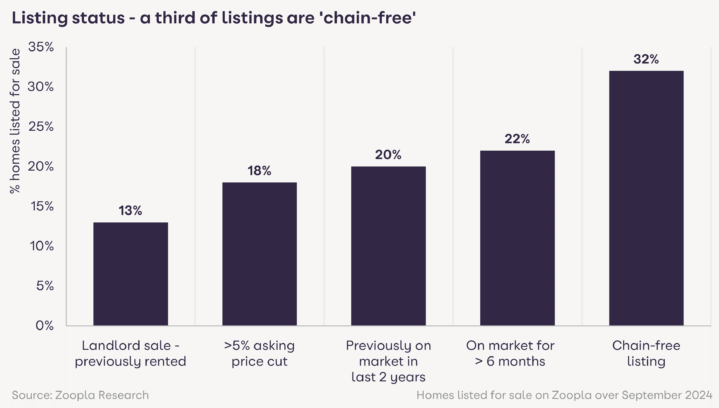
Rising sales volumes and modest house price inflation are positive for the housing market.There are sufficient levels of market activity to keep drawing in new buyers who are prepared to make sensible offers on competitively-priced homes.Sellers remain keen to get the best price for their home to unlock their next move, but buyers remain price-sensitive and have a greater choice of homes to buy.
While sales prices have firmed, we find that almost 2 in 5 sales (37%) are agreed at more than 5% below the initial asking price. This highlights how a high proportion of buyers continue to make offers below the asking price and while this proportion has improved from a year ago, it stays at a level which suggests single-digit house price growth lies ahead.
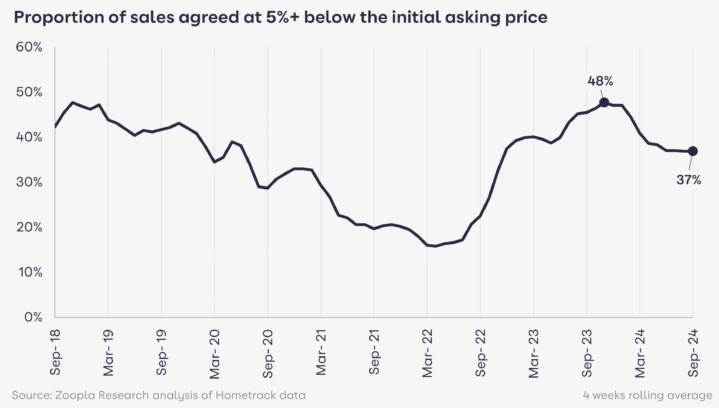
The housing market continues to adjust to higher borrowing costs through low house price growth and a steady recovery in sales.Expectations of lower mortgage rates are a real attraction for wouldbe movers, with some lenders offering mortgage rates below 4%.
The outlook for interest rates is far from certain though, considering global events.Today’s ‘fixed’ mortgage rates already reflect the extent to which financial markets expect UK interest rates to move lower in the next 2-5 years.
Our view is that mortgage rates will settle in the high 3% and low 4%s into 2025, meaning a modest improvement in borrowing costs over the coming months. Together with rising household incomes this will help improve affordability for home buyers and support sales volumes.
The outlook is more positive than it was a year ago, but sellers need to manage their expectations on pricing if they are serious about agreeing a sale in a timely manner.
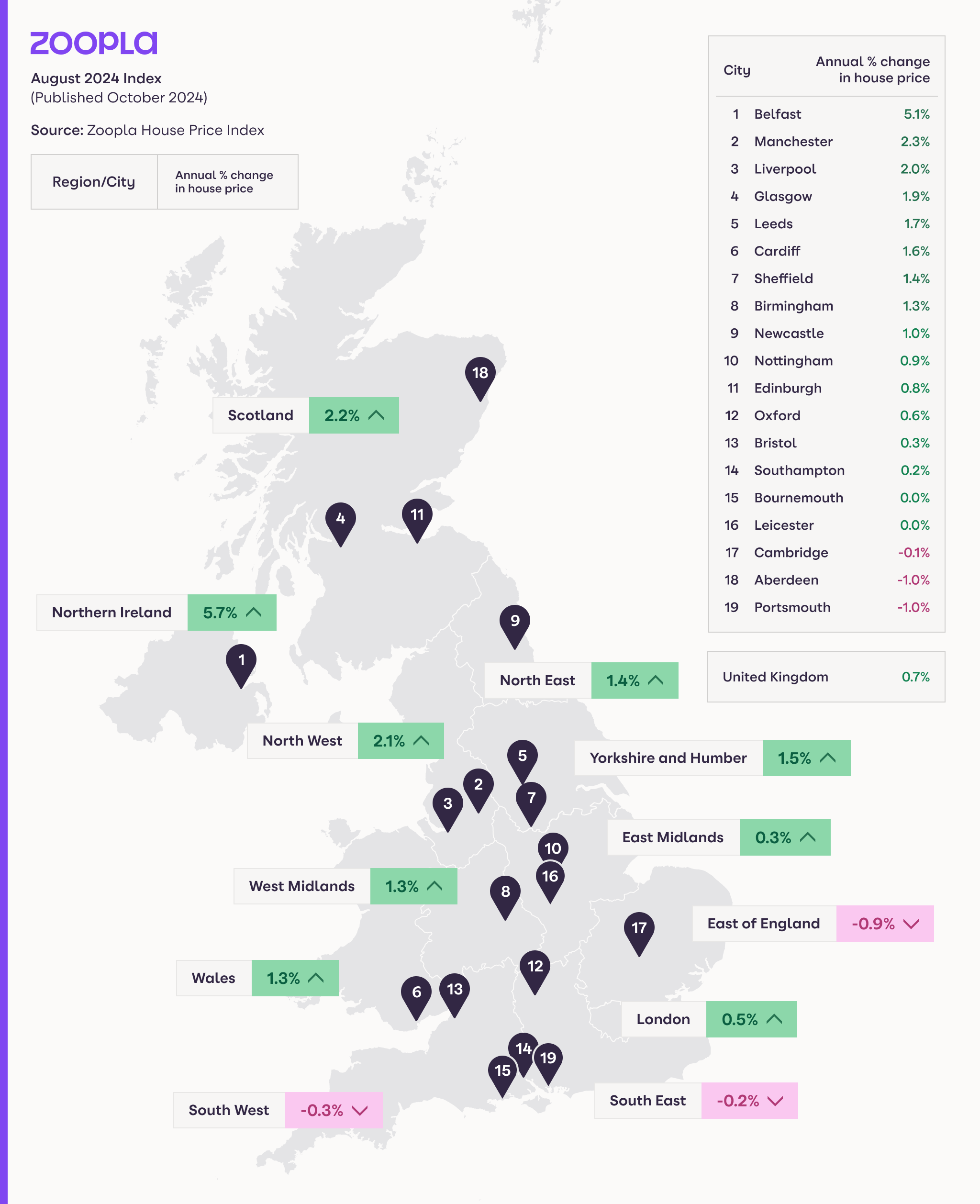
Source: Zoopla House Price Index. Sparklines show last 12 months trend in annual and monthly growth rates – red bars are a negative value – each series has its own axis settings providing a more granular view on price development.

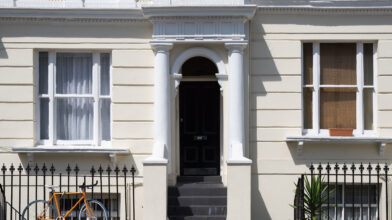
UK house prices increase 1.6% as tariffs, stamp duty changes and broader economic uncertainty dampen buyer demand
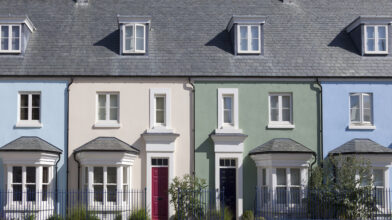
House price inflation slows to 1.8% as the supply of homes for sale outpaces the growth in sales agreed
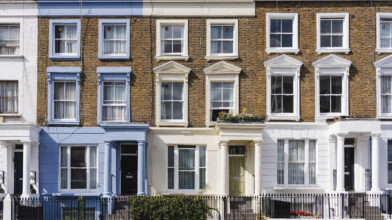
The housing market gets off to its strongest start in three years, with new sales agreed up 12 per cent on 2024.